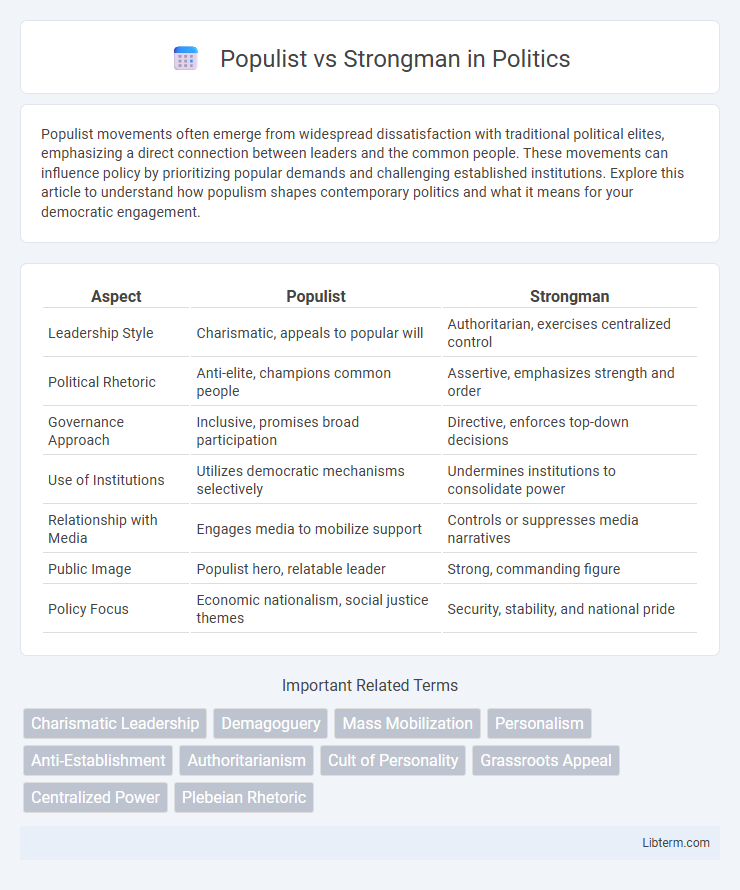Populist movements often emerge from widespread dissatisfaction with traditional political elites, emphasizing a direct connection between leaders and the common people. These movements can influence policy by prioritizing popular demands and challenging established institutions. Explore this article to understand how populism shapes contemporary politics and what it means for your democratic engagement.
Table of Comparison
| Aspect | Populist | Strongman |
|---|---|---|
| Leadership Style | Charismatic, appeals to popular will | Authoritarian, exercises centralized control |
| Political Rhetoric | Anti-elite, champions common people | Assertive, emphasizes strength and order |
| Governance Approach | Inclusive, promises broad participation | Directive, enforces top-down decisions |
| Use of Institutions | Utilizes democratic mechanisms selectively | Undermines institutions to consolidate power |
| Relationship with Media | Engages media to mobilize support | Controls or suppresses media narratives |
| Public Image | Populist hero, relatable leader | Strong, commanding figure |
| Policy Focus | Economic nationalism, social justice themes | Security, stability, and national pride |
Understanding Populism: Definition and Origins
Populism is a political approach that seeks to represent the interests of ordinary people against perceived elites or establishment forces, often characterized by anti-elitist rhetoric and calls for direct democracy. It originates from social and economic grievances, gaining momentum during periods of crisis or polarization when citizens feel marginalized or ignored by traditional political institutions. Populism can manifest across the political spectrum and is distinguished by its emphasis on mobilizing mass support through charismatic leadership and simplified messages.
The Rise of Strongman Leaders: A Historical Perspective
Strongman leaders have historically risen during periods of political instability and economic crisis, exploiting nationalist sentiments and charismatic authority to consolidate power. Unlike populists who emphasize mass mobilization and democratic rhetoric, strongmen prioritize centralized control, often undermining institutional checks and balancing mechanisms. Key examples include Benito Mussolini in Italy and Augusto Pinochet in Chile, whose regimes highlight the dangers of concentrated autocratic leadership in modern history.
Key Differences: Populist vs Strongman Ideologies
Populist ideologies emphasize mass mobilization and direct appeal to the general population, often positioning themselves against elite establishments by promoting inclusive rhetoric and participatory democracy. Strongman ideologies prioritize centralized authority, relying on charismatic leadership, intimidation, and control over institutions to maintain power, often at the expense of democratic norms and political opposition. While populism seeks broad support through rhetoric and grassroots engagement, strongman politics emphasizes authoritarian control and the consolidation of power.
Methods of Gaining Support: Charisma, Media, and Messaging
Populist leaders gain support by leveraging direct communication that appeals to public grievances, often using social media platforms to bypass traditional media filters and amplify their messages. Strongman figures rely heavily on charismatic authority, projecting a tough, decisive image through state-controlled media to cultivate loyalty and suppress dissent. Both use tailored messaging strategies: populists emphasize inclusion and the common people's struggle, while strongmen promote order, nationalism, and strength to consolidate power.
Economic Promises: Populist and Strongman Approaches
Populist leaders often promise immediate economic relief through policies such as wealth redistribution, job protection, and increased social spending that appeal directly to the disenfranchised. Strongman leaders emphasize economic stability and national strength, promoting infrastructure projects, military expansion, and state control over key industries to demonstrate power and control. Both approaches leverage economic promises to gain public support but differ in execution: populists focus on short-term gains and inclusivity, whereas strongmen prioritize centralized authority and long-term dominance.
Impact on Democracy: Erosion or Empowerment?
Populist leaders often claim to represent the "true will" of the people, which can erode democratic institutions by undermining checks and balances and delegitimizing opposition parties. Strongman rulers concentrate power in their own hands, frequently bypassing legal frameworks and weakening judicial independence, leading to authoritarian governance. Both approaches risk destabilizing democracy, but populist movements sometimes empower marginalized groups by mobilizing popular support and challenging elite dominance.
Nationalism and Identity Politics in Leadership Styles
Populist leaders emphasize nationalism by appealing to collective identity and cultural unity, often leveraging identity politics to mobilize support from marginalized or majority groups. Strongman leaders enforce nationalism through centralized authority, prioritizing national sovereignty and traditional values while suppressing dissent to maintain control. Both leadership styles manipulate identity politics, but populists foster inclusion within a national identity narrative, whereas strongmen impose exclusionary or authoritarian definitions of belonging.
Populist and Strongman Leaders: Global Case Studies
Populist leaders often mobilize mass support by appealing directly to the people against perceived elites, exemplified by figures like Hugo Chavez in Venezuela and Jair Bolsonaro in Brazil. Strongman leaders, such as Vladimir Putin in Russia and Recep Tayyip Erdogan in Turkey, maintain power through centralized authority, control over institutions, and sometimes coercive measures. These global case studies reveal how both leadership styles challenge traditional democratic norms by prioritizing personal authority and nationalist rhetoric.
Societal Consequences: Division, Polarization, and Unity
Populist leaders often deepen societal division and polarization by framing politics as a struggle between "the pure people" and corrupt elites, which can entrench identity-based conflicts and reduce social cohesion. Strongmen consolidate power through authoritarian means, suppressing dissent and limiting pluralism, which may create a veneer of unity while undermining democratic institutions and fostering long-term instability. Both approaches challenge democratic norms but differ in their impact on social unity: populism amplifies fragmentation, whereas strongman rule enforces unity through coercion.
The Future of Leadership: Lessons from Populist and Strongman Eras
Populist and strongman leadership styles reveal contrasting approaches to governance and public engagement, offering critical insights for future leaders. Populist leaders emphasize mass mobilization and direct appeal to the people, often leveraging social media platforms to shape political narratives and disrupt traditional institutions. Strongman leaders prioritize centralized authority and control, demonstrating how authoritarian tactics can consolidate power but risk undermining democratic norms and stability over time.
Populist Infographic

 libterm.com
libterm.com